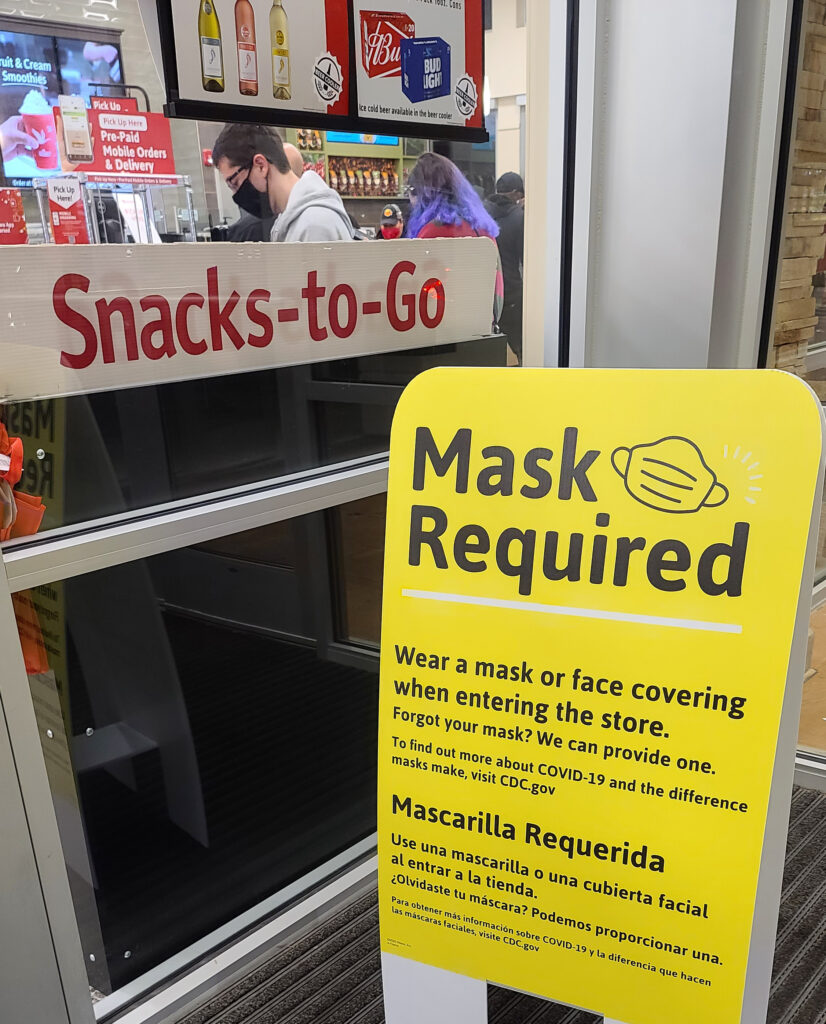No mask, no service

A mask required sign is shown at the Wawa on State Road 200 in Ocala, Fla. on. Monday, Dec. 7, 2020. [Bruce Ackerman/Ocala Gazette] 2020.

A mask required sign is shown at the Wawa on State Road 200 in Ocala, Fla. on. Monday, Dec. 7, 2020. [Bruce Ackerman/Ocala Gazette] 2020.
With COVID-19 cases setting records in the United States every day, and new federal aid legislation stalled in Congress, area businesses are working hard to limit the virus’ impact on both their customers and their wallets.
Key to that effort is the simple yet still controversial practice of requiring face masks for all customers and employees, a strategy being used by virtually all area stores.
As of Dec. 5, the Centers for Disease Control and Prevention now recommends universal mask-wearing while away from home, saying “the coronavirus pandemic in the U.S. has entered a phase of ‘high level transmission’” after hitting a record number of deaths on Dec. 2 – 2,800 in a single day.
The CDC report further recommends state and local officials enact mask mandates for indoor locations – stores, restaurants, crowded areas, etc. – as part of larger mitigation efforts to control the spread of the virus.
According to literature on its website, the Florida Department of Health in Marion County echoes the CDC recommendations.
“There are certain situations where people are more vulnerable to COVID-19 spread,” an Health Department administrator said via email. “This includes when people are in closed spaces with poor ventilation, crowded places with many people nearby and close contact settings, such as close-range conversation. Understanding that many normal activities have resumed and businesses have reopened, practicing social distancing, regularly washing your hands, and wearing facial coverings where social distancing cannot occur continue to be the best ways to mitigate the spread of the virus in these types of situations.”
Meanwhile, Florida Governor Ron DeSantis has so far rejected a statewide mask mandate, leaving the matter mostly in local governments’ hands.
“I’m opposed to mandates, period,” DeSantis said during his first coronavirus press briefing in a month on Dec. 1. “I don’t think they work. People in Florida wear them (masks) when they go out. I don’t think you have to be strung up by a bayonet to do it.”
The Ocala-Marion County Chamber and Economic Partnership has worked closely with the city, after Ocala implemented its own mask mandate on August 12.
“It’s wasn’t only about working with the city,” Kevin Sheilley, chief executive officer at the CEP, said. “It was about sending out and providing information to businesses about what the mandate means and providing them with the proper resources to implement it correctly and safely. That has been a big piece of our role.”
The CEP also helped facilitate Marion County’s portion of the CARES Act fund, a $2.2 trillion economic stimulus bill passed by Congress in March. This fund provided over $300,000 to local businesses to help them buy personal protective equipment such as face masks and hand sanitizer for their employees as well as their customers.
But small businesses aren’t the only businesses shouldering the responsibility of the pandemic. Larger corporations, such as the Washington Prime Group Inc., a real estate investment trust and current owner of the Paddock Mall, must navigate the same mask mandates as their smaller, privately owned neighbors.
Paddock Mall’s “Code of Conduct” requires guests to cover their mouths and noses with a cloth face covering in accordance with state and local guidelines. In addition, guests must adhere to each individual tenant’s COVID-19 policies while shopping.
“The health and safety of our guests, retailers and employees is our top priority,” the Washington Prime Group said in an email. “Paddock Mall is committed to providing a safe and enjoyable shopping experience for our guests. We are finding innovative ways to celebrate the holiday season, while [still] remaining socially distant.”
As businesses fight to remain open, many retail workers have unwillingly turned into de facto enforcers of public health guidelines, challenging customers who refuse to wear masks or maintain social-distancing protocols.
For Paula King, owner of the home and décor store Agapanthus, the wearing of masks in general, as well as in her store, is more of a logical choice than one reductively political.
“We’re making our decisions based on what the medical community is saying,” King said. “It’s that simple. It’s germ theory, really. We’re just trying to stay open, so, yes, we do ask that our patrons wear masks while they’re in the shop.”
If customers don’t have masks, King is happy to provide them. If they decline to wear them, she politely restates her mask-wearing policy.
“And if they choose to leave,” King said, “it makes me sad, but that’s how it is. I’m really having a hard time keeping my store staffed and open right now.
“I think if people really understood that this was a question of small-business survival,” King added, “they might consider going to the trouble of putting a mask on.”





